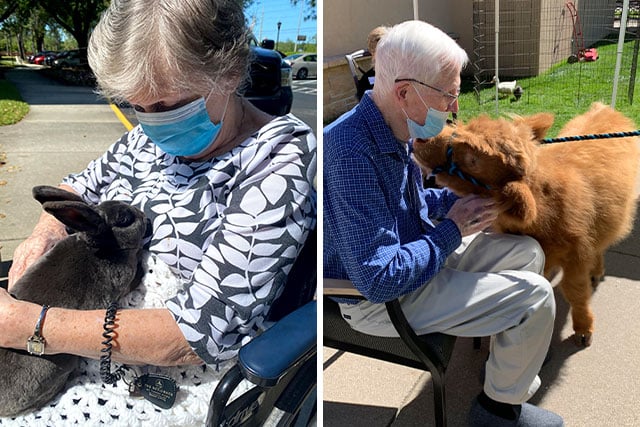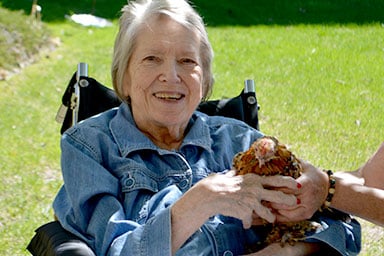
Throughout human history, dogs have been called “man’s best friend,” so it is not surprising that the feelings of joy sparked through animal/human interactions can have measurable benefits for older adults.
An ever-growing body of scientific research finds that animal-assisted therapy programs, also known as pet therapy programs, have proven effective among residents of senior living communities, providing comfort, enjoyment, and health-restorative qualities.
Animal-assisted therapy is an increasingly popular field that uses dogs or other animals to help people recover from or deal with health problems such as heart disease, cancer, or mental health disorders. That's why The Goodman Group is so excited by the effectiveness of animal-assisted therapy programs in their managed communities.
How Pet Therapy Works
 In just 15 minutes after bonding with an animal, a chemical chain reaction starts in the brain, lowering the fight-or-flight hormone cortisol levels and increasing the production of the feel-good hormone serotonin.
In just 15 minutes after bonding with an animal, a chemical chain reaction starts in the brain, lowering the fight-or-flight hormone cortisol levels and increasing the production of the feel-good hormone serotonin.
Researchers at Harvard University have found that interacting with animals promotes heart health. Heart rate, blood pressure, and stress levels soon drop. Over time, pet and human interactions can lower cholesterol levels, help fight depression, and may even help protect against heart disease and stroke.
Maintaining sanitation protocols is a critical component in offering any form of animal-assisted therapy. Hospitals and health centers using pet therapy take precautions to make sure that all animals are well-trained, clean, and up to date with all vaccinations. Caring for our beloved creatures ensures the animals remain healthy and free from any illness. The Centers for Disease Control and Prevention frequently publishes recommendations and industry standards that guide how to keep pet therapy sessions healthy for all involved.
Pets Help With Sundowner’s Syndrome
For many seniors living with Alzheimer’s disease or dementia, the end of the day can be a time of increased memory loss, confusion, or agitation. Animal-assisted therapy has proven to be a powerful tool for what’s known as “Sundowner’s Syndrome” – evening periods of increased agitation and confusion in people with Alzheimer's.
Animals’ non-verbal communication and deep acceptance can be soothing for those with difficulty using language. Some seniors even connect with memories of their own treasured pets through the familiar, fluffy faces of therapy animals.
Making New P.A.L.S.
 Partnering with Animals to Lift Spirits, or P.A.L.S., is an exciting partnership between senior living communities managed by The Goodman Group and community partners, such as trained animal-assisted interactions professionals at the University of Minnesota, to promote wellness in residents by interacting with a variety of therapy animals.
Partnering with Animals to Lift Spirits, or P.A.L.S., is an exciting partnership between senior living communities managed by The Goodman Group and community partners, such as trained animal-assisted interactions professionals at the University of Minnesota, to promote wellness in residents by interacting with a variety of therapy animals.
Through P.A.L.S., residents meet animals ranging from cats, dogs, rabbits -- even chickens. These highly anticipated and popular meetings bring a unique therapy that improves residents’ physical, social, psychological, and cognitive processes.
Residents rarely miss an opportunity to interact with the therapy animals. They come to the lobbies early, choose the perfect place to sit, and wait for the animals to arrive. The animals look forward to visiting each week, too – intelligent dogs can always tell which residents will have treats waiting for them.
Animal-Assisted Therapy is Effective
 Caring for an animal can be especially helpful for aging adults who are unable to get outside as much as they would like to. The unconditional love of a cherished pet can be a bridge to further socialization, mental stimulation, lowered stress, and reinvigorated interest in daily activities. Activities such as walking a dog make for great cardiovascular exercise. And the simple act of caring for an animal – petting, brushing, feeding – provides calming therapy and a way to stay engaged with the world.
Caring for an animal can be especially helpful for aging adults who are unable to get outside as much as they would like to. The unconditional love of a cherished pet can be a bridge to further socialization, mental stimulation, lowered stress, and reinvigorated interest in daily activities. Activities such as walking a dog make for great cardiovascular exercise. And the simple act of caring for an animal – petting, brushing, feeding – provides calming therapy and a way to stay engaged with the world.
Animals can help seniors feel needed, translating into a greater sense of purpose and self-worth.

